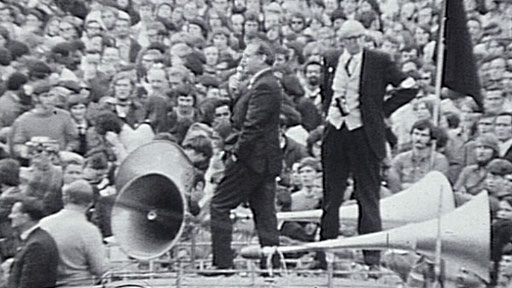‘Lest We Forget what it was like: Bobbie Oliver’s book, Hell No! We Won’t Go! Resistance to Conscription in Post War Australia’, Honest History, 27 April 2022
David Stephens reviews Bobbie Oliver’s book, Hell No! We Won’t Go! Resistance to Conscription in Post War Australia
Bobbie Oliver is an Honorary Research Fellow at the University of Western Australia. She grew up in a conservative family in rural Queensland. This is her 16th book and one of the earlier ones was Peacemongers: Conscientious Objectors to Military Service in Australia, 1911 to 1945 (1997). The new book looks in detail at the two post-World War II conscription schemes, 1951-59 and 1965-72. They were Australia’s third and fourth operating conscription programs, following ‘boy conscription’ before World War I and conscription for limited overseas service in 1942-43.
 Our biggest brush with conscription, however, was in 1916-17, courtesy of Prime Minister WM Hughes, but that attempt failed due to public opposition. In the midst of war, Australia was more divided then than at any other time in its history. The relative lack of a public outcry is one of the notable features of the two post-World War II schemes, at least in their early years.
Our biggest brush with conscription, however, was in 1916-17, courtesy of Prime Minister WM Hughes, but that attempt failed due to public opposition. In the midst of war, Australia was more divided then than at any other time in its history. The relative lack of a public outcry is one of the notable features of the two post-World War II schemes, at least in their early years.
I distilled the following five main points from Oliver’s book, concentrating particularly on her treatment of the 1965-72 scheme. I have a bias: I was born in 1949, I registered for conscription as a conscientious objector, my birthdate marble was drawn from the barrel early in 1969, I completed my educational deferment, then started a job while continuing to study part-time, becoming at that point legally a ‘National Service Act defaulter’ – by failing to report to the Department of Labour and National Service following the end of my educational deferment. More later about what that meant in practice.
First point on Oliver’s book: the Commonwealth’s 1965-72 policy was quite cynical: to produce a minimal impact on Australians as a whole while making a token contribution to expeditionary forces with great and powerful friends. The minimal impact emerges from the figures: 804,000 registered for conscription; 63,735 conscripted (or eight per cent of registrants); 19,000 conscripts served in Vietnam; 200 conscripts killed in action. Each one of these deaths was a tragedy, but most Australian families were not directly touched.
Second point: the targeting of a limited number of young men produced a feeling of isolation among those targeted, who also dealt with a lack of empathy from their friends and families, many of whom were susceptible to a fear of communism, a fear fanned by governments. A Liberal Party advertisement in 1966 depicted the southward thrust of communism towards Australia from China, in much the same way that, during World War II, posters showed the advancing ‘Jap’.
The strength of the book, however, is in its stories of individuals. Michael Hamel-Green’s number came up in 1965 and he recalls his feelings then: ‘I visualised what the army wanted to do to and with me … My future stolen.’ Ken Mansell and many others resented that their lives were being determined by a lottery. Many conscripts were taunted by relatives insisting military service ‘will make a man of you’. My own father, who suffered for the rest of his life from PTSD from World War II service, and whose brother, my uncle, had not returned from that war, counselled me to consider whether my ‘grand gesture’ of registering as a conscientious objector would turn out to be a fizzer. My aunt, whose brother, another uncle of mine, had been listed ‘missing in action’, made her view clear that I was not following his example of service. (My mother, her sister, kept her own counsel.)
(Joey Watson/Liberal Party of Australia)
The pictures on pages 80 and 84 of the book (short back-and-sides police arresting protesters) encapsulate the attitudes of much of Australia towards the minority who stood against conscription for Vietnam: if you want to do this you can cop the consequences or, at the very least, you are on your own, mate, as the rest of us have stuff to do and lives to live. I can still recall the looks and comments I received from fellow workers on my holiday job when I told them that my number had come up: ‘Geez mate, that’s tough!’ (Unspoken: whew! Could have been me. Now, on with life, not bothered!) I recall a debate at my (Methodist) church in 1970 on the topic, ‘Whether it is better to be dead than Red’. I plumped for ‘Red’, but the place was divided.
Thirdly, isolation and propaganda added to the uncertainty of many conscripts about their motivations and tended to produce erratic behaviour. There were very few ‘heroic’ and unswerving resisters, but those who were heroic showed bravery equal to anything displayed on battlefields. Even the waverers showed a form of courage, though not always consistently. Rowan Cahill’s story about burning his draft card, then asking the Department of Labour and National Service to send him another one, rings very true: I tore up one piece of correspondence from the Department, then taped it together again, just in case. Those like me whose conscientious objection was to a particular war, rather than based on pacifist beliefs, were guaranteed a particularly forensic (and unsympathetic) grilling from magistrates if their objection ever came to court. It was a lot easier to have an objection based on one’s membership of a minority religious sect than it was to work out a principled position based on thinking and research.
Fourthly, as the Vietnam War wore on, the public became less supportive of it and governments lost confidence in themselves and in conscription. By mid-1969, a majority of Australians favoured withdrawal from Vietnam; the Coalition’s loss of seats at the 1969 election was due in part to disillusionment with the war and the government that had prosecuted it. Opponents of conscription also became more forceful, arguing not just for exemptions for individuals but for an end to the whole iniquitous scheme. Protests became more violent, and then more organised and much larger, culminating in the massive moratoriums of 1970 and 1971.
Fifthly and finally, as the war and the atmosphere changed, it became easier for resisters to live with the threat, provided they kept their heads down, though there were always risks from various quarters, plus the backwash from spectacular resister stunts, when the powers that weren’t really (led by the thoroughly nasty Coalition Attorney-General, Ivor Greenwood) felt the need to make an example of someone – if they could only collar them.
Melbourne Moratorium May 1970 with Jim Cairns MP and Sam Goldbloom on the truck (ABC)
By the second half of 1970 only five per cent of non-registrants (and a smaller percentage of total non-compliers) had been prosecuted. I pretty much ignored the Department, and they pretty much ignored me, except for one occasion in 1970 or 1971 when they turned up at my workplace. I was at lunch and the Department’s officers went away and did not return. As the war wound down, so did the commitment of the men from the Department. (While I have no proof of this, I think I may have been dobbed in by a work colleague, whose husband was a son of General Sir William Bridges of Gallipoli fame. I had been introduced to this gentleman as a draft resister and he was not sympathetic.)
The book is well-written, carries lightly the weight of its extensive research, has an arresting cover (no pun), and has almost no typoes or (as far as I could tell) misspelt names. The coverage of the 1951-59 scheme has hardly been mentioned in this review but fills what has been something of a gap in Australian historiography. The treatment of the Vietnam years is even more worthy, given the misleading versions of that period that have come down to us from some sources. (See other material on the Honest History site which also shafts some myths: use our Search engine with names ‘Caulfield’, ‘Dapin’, ‘Edwards’). The appendices are invaluable, containing the names of nearly 800 resisters, and information about their cases.
Oliver rounds the book off neatly with some information about what happened to the draft resisters in later years, and what happened to the relevant legislation, which has been changed to rule out a 1965-72 style scheme being reintroduced. Acts can be changed again, of course, but this reviewer hopes fervently that the bastardry of the Menzies-Holt-Gorton scheme is never repeated. It was a thoroughly disgraceful period of our history.
Oliver’s summary of the significance of the fight against conscription is worth quoting in full:
In assessing the impact of anti-war protest in the 1950s, 1960s and 1970s, it is necessary to take a long-term view. Despite the differences between the Vietnam draft resisters and their predecessors, it is possible to trace a common heritage among all COs and war resisters of the 20th century. They stood up for their principles when those principles were not merely unpopular but completely untenable to a majority. In wartime, objectors were accused of cowardice and of conspiring with the enemy; in peacetime, they were despised as being ‘soft’ and ‘unmanly’ because they did not relish military training. Their sacrifices and heroism were unrecognised by a society wedded to the notion that ‘sacrifice’ and ‘heroism’ necessarily involved active service overseas, fighting wars that were sometimes only marginally strategic for Australia.
As for the effects of that era on individuals, I can confirm that they never leave you. But the effect on us is nothing compared with the effect on the people of Vietnam. Lest We Forget them.
Agent Orange victims, Ho Chi Minh City, Vietnam, 2004 (Wikimedia Commons/Alexis Duclos)
*David Stephens is editor of the Honest History website and co-editor with Alison Broinowski of The Honest History Book. He and Bobbie Oliver are co-editors for book reviews for the Labour History journal.

